 June 2022 in “International Journal of Advanced Research in Science, Communication and Technology”
June 2022 in “International Journal of Advanced Research in Science, Communication and Technology” The herbal shampoo promotes hair growth and strength without damage.
 January 2023 in “Indian Dermatology Online Journal”
January 2023 in “Indian Dermatology Online Journal” Micropigmentation is a cosmetic tattooing technique for hiding skin issues and creating permanent makeup, but it can have side effects.
 November 2023 in “Indian Journal of Dermatology, Venereology and Leprology”
November 2023 in “Indian Journal of Dermatology, Venereology and Leprology” Using a mechanical pencil to hold a needle makes hair transplant surgery easier and faster.
 November 2023 in “International Journal For Multidisciplinary Research”
November 2023 in “International Journal For Multidisciplinary Research” Herbal hair oil made with natural ingredients helps reduce hair loss, dandruff, and graying.
5 citations,
March 2014 in “Indian Journal of Dermatology”  April 2024 in “Indian journal of ophthalmology. Case reports”
April 2024 in “Indian journal of ophthalmology. Case reports” Using minoxidil for hair loss might rarely cause a vision problem where fluid builds up under the retina.
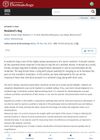 November 2023 in “Indian Journal of Dermatology/Indian journal of dermatology”
November 2023 in “Indian Journal of Dermatology/Indian journal of dermatology” A well-equipped resident's bag enhances clinical skills, preparation, confidence, and learning for junior doctors.
2 citations,
March 2022 in “Indian Journal of Psychiatry/Indian journal of psychiatry” The conclusion is that careful management of both psychiatric and skin conditions is crucial for HIV patients, using medication and interdisciplinary approaches.
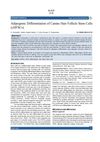 March 2022 in “Indian Journal of Animal Research”
March 2022 in “Indian Journal of Animal Research” Dog hair follicle stem cells can turn into fat cells.
 2 citations,
June 2023 in “Indian journal of dermatology, venereology, and leprology”
2 citations,
June 2023 in “Indian journal of dermatology, venereology, and leprology” Janus kinase inhibitors can regrow hair in alopecia areata but may cause side effects and hair loss may return if treatment stops.
January 2023 in “Indian Dermatology Online Journal” Female pattern hair loss in Western India is common and often linked to metabolic syndrome.
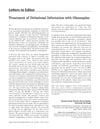 3 citations,
July 2012 in “Indian Journal of Psychological Medicine”
3 citations,
July 2012 in “Indian Journal of Psychological Medicine” Olanzapine helped a man who thought he had bugs on his skin.
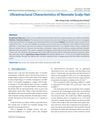 July 2016 in “Indian journal of science and technology”
July 2016 in “Indian journal of science and technology” Neonate scalp hair is thinner, lacks a medulla, and has smaller follicles compared to adult hair.
February 2022 in “Journal of pharmaceutical research international” The herbal baby shampoo is safe, cleans well, and promotes healthy hair.
1 citations,
October 2021 in “Indian Journal of Plastic Surgery” The paper offers a clear guide for diagnosing and treating hair loss, helping surgeons decide on hair transplant timing and extent.
6 citations,
January 2019 in “Indian Journal of Dermatology, Venereology and Leprology” Low-cost dermoscopes can effectively diagnose early female pattern hair loss.
1 citations,
February 2022 in “Indian Journal of Nutrition and Dietetics/Indian journal of nutrition and dietetics” Muslim women in Coimbatore with limited sunlight exposure due to cultural dress and lifestyle have low vitamin D levels.
1 citations,
January 2022 in “Indian dermatology online journal” Fine needle aspiration with rapid on-site evaluation is useful for diagnosing pilomatrixoma.
 February 2020 in “The Pharmaceutical Society of Japan”
February 2020 in “The Pharmaceutical Society of Japan” Amla extract may help hair grow.
 October 2022 in “Indian Journal of Pharmacy Practice”
October 2022 in “Indian Journal of Pharmacy Practice” PCOD and PCOS are two different health conditions that often get confused.
 June 2024 in “Indian Journal of Plastic Surgery/Indian journal of plastic surgery”
June 2024 in “Indian Journal of Plastic Surgery/Indian journal of plastic surgery” A new method helps ensure long-lasting hair transplant results by accurately calculating the donor area.
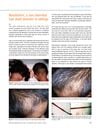 4 citations,
January 2014 in “Indian dermatology online journal”
4 citations,
January 2014 in “Indian dermatology online journal” Monilethrix is a genetic hair disorder causing fragile, beaded hair with no effective treatment.
 1 citations,
June 2021 in “Journal of gynecology and womens health”
1 citations,
June 2021 in “Journal of gynecology and womens health” The study found that PCOS affects about 6.5-6.8% of women in both urban and rural areas of Telangana, India, and highlighted the importance of lifestyle changes for management.
 3 citations,
October 2021 in “Indian Journal of Plastic Surgery”
3 citations,
October 2021 in “Indian Journal of Plastic Surgery” Early diagnosis and aggressive treatment are important for managing scarring alopecia; hair transplantation's effectiveness is uncertain.
 1 citations,
April 2022 in “Indian Journal of Plastic Surgery”
1 citations,
April 2022 in “Indian Journal of Plastic Surgery” Hormone therapy greatly improves the quality of life for adults seeking gender reaffirmation, but more research is needed in India.
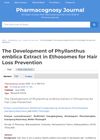 3 citations,
June 2020 in “Pharmacognosy Journal”
3 citations,
June 2020 in “Pharmacognosy Journal” Phyllanthus emblica extract in ethosomes could potentially prevent hair loss.
July 1999 in “Indian Journal of Dermatology, Venereology and Leprology” October 2011 in “Indian journal of applied research”  6 citations,
August 2019 in “Indian drugs”
6 citations,
August 2019 in “Indian drugs” Ethosomes improve drug delivery through the skin and show promise for treating male pattern baldness.
 April 2024 in “Indian Journal of Paediatric Dermatology”
April 2024 in “Indian Journal of Paediatric Dermatology” Congenital triangular alopecia and vitiligo can occur together, but treatment for one may not affect the other.




















